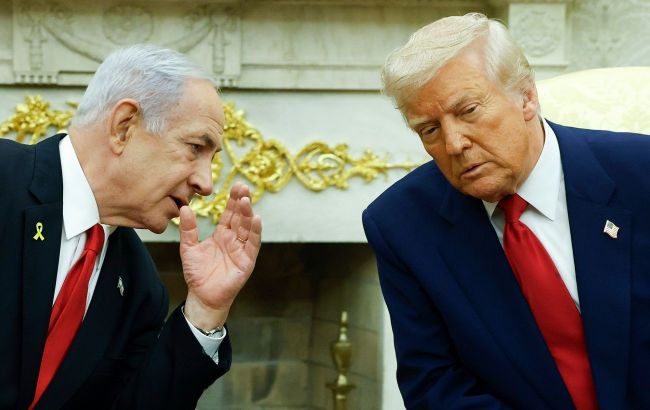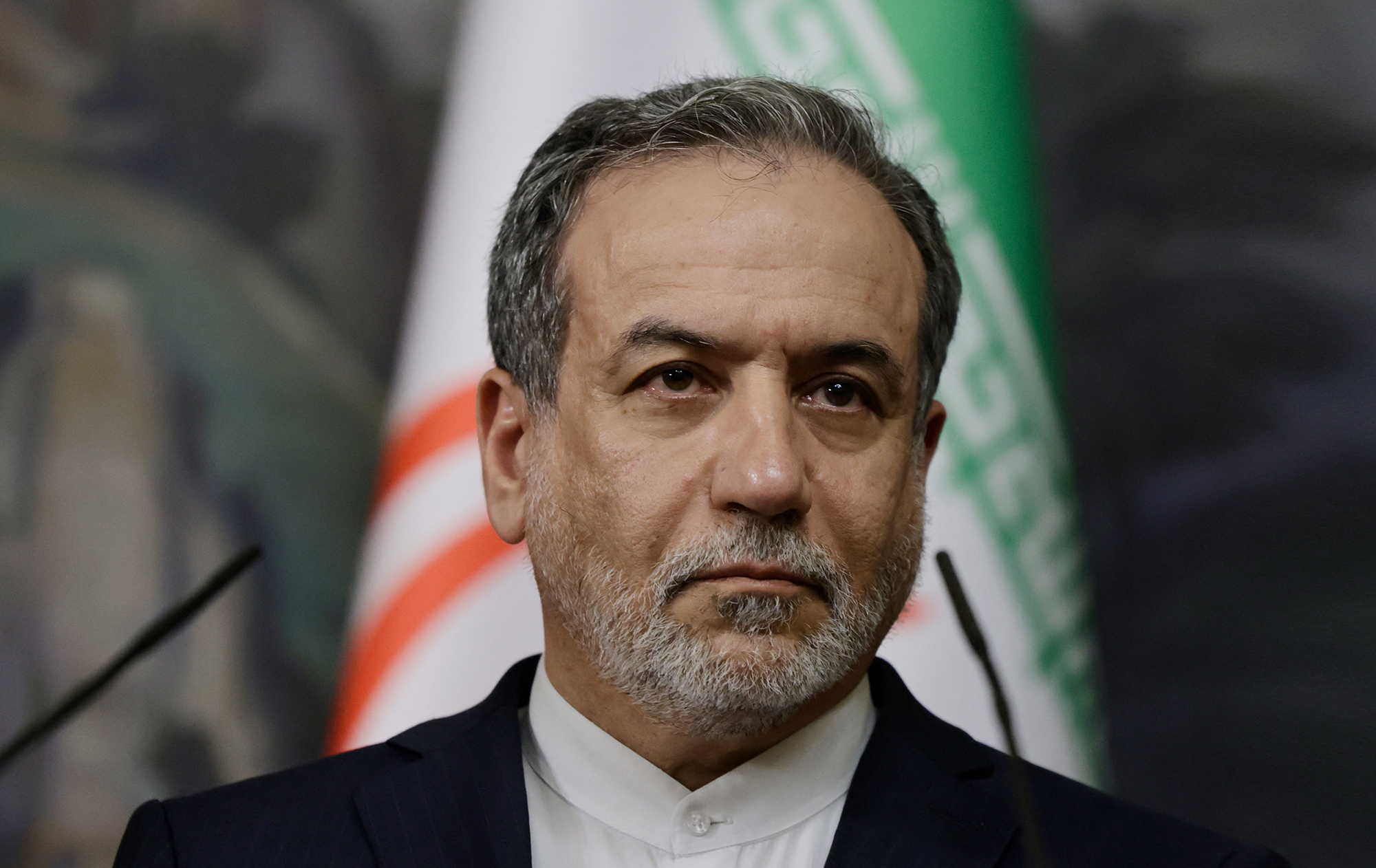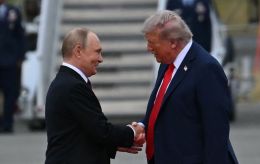Bombs or diplomacy: Will Trump back Israel in a war with Iran?
 Benjamin Netanyahu and Donald Trump (photo: Getty Images)
Benjamin Netanyahu and Donald Trump (photo: Getty Images)
Tensions between Israel and Iran continue in the Middle East, with an exchange of strikes ongoing for more than a week. Meanwhile, diplomatic negotiations are underway on de-escalation and the possible involvement of the United States in strikes against Iran.
RBC-Ukraine reports on the latest developments in the confrontation, attempts at diplomacy, and Donald Trump’s doubts.
Key questions:
- What results have Israel’s attacks yielded, and how is Iran responding?
- What does Trump say about the conflict?
- How is Europe trying to act as a mediator?
- What influences Iran’s position in the future?
Israel’s military operation against Iran has entered a routine phase. Every day, the Israeli Air Force carries out strikes on military infrastructure and nuclear facilities, and is methodically eliminating Iranian leaders and top nuclear scientists. At the same time, Iran’s top political leadership remains untouched, although Israel is calling for the overthrow of the government in Tehran.
In turn, Iran is responding with missile and drone attacks on Israel, although their intensity has significantly decreased, from more than a hundred in the first days of the conflict to fewer than ten missiles per attack. This is partly explained by the destruction of a large number of Iranian launchers and the need to conserve ammunition. Iran is demonstrating that it can intensify attacks. For example, on June 19, it launched 30 missiles at Israel.
At the start of the conflict, Israel’s missile defense showed high effectiveness, intercepting 90–95% of missiles. However, since the beginning of the week, interception effectiveness has dropped to about 65–80%. According to NBC News, the reason is Iran’s use of more advanced missiles with multiple warheads, making interception more difficult.
US position
Israel currently lacks the capability to fully destroy Iran’s nuclear program. As RBC-Ukraine reported, one of Iran’s facilities – the Fordow nuclear facility – is located deep inside a mountain. Only the specialized American GBU-57 (MOP) bomb can likely destroy it. Therefore, US involvement is needed to eliminate Fordow.
US President Donald Trump is in no hurry to join the strikes against Iran. Over the past week, he has made a number of contradictory statements on the issue and has also called on Iran to surrender.
On June 19, White House press secretary Karoline Leavitt said that Trump would decide on Washington’s involvement in the war within the next two weeks. According to Leavitt, the decision on US participation in the conflict requires time because there is a possibility of talks with Iran, which may or may not take place in the near future. She also emphasized that the White House administration seeks a diplomatic resolution to the situation with Iran, but the main priority is to prevent Tehran from obtaining nuclear weapons.
Trump believes that strikes on Iran should be delivered only if the so-called bunker-buster bomb can truly guarantee the destruction of the facility at Fordow, The Guardian reports. According to its sources, there is currently no certainty about this within the White House. Trump appears not to be fully convinced of the strike’s effectiveness and hopes that the mere threat from the US will push Iran toward concessions.
For its part, Israel continues trying to persuade Trump to join the strikes on Iran. On June 19, Israeli Prime Minister Benjamin Netanyahu and IDF leadership held a meeting with representatives of the Trump administration – US Vice President JD Vance and Secretary of Defense Pete Hegseth.
Meanwhile, the US is deploying more forces to the Middle East. On June 16, a strike group led by the aircraft carrier Nimitz left the South China Sea and headed toward the Middle East. The US Navy ordered the destroyer Thomas Hudner to move to the Eastern Mediterranean, while another destroyer was instructed to advance in readiness for potential action by the White House.
The US has also relocated some aircraft and ships from Middle Eastern bases that may be vulnerable to potential Iranian attacks. But there are no reports of B-2 Spirit bombers being deployed to the region, which are capable of carrying bombs to destroy Fordow.
Iran and negotiations
Despite the exchange of strikes with Israel, Iran continues its dialogue with the US and Europe. According to Reuters, Trump’s special envoy Stephen Witkoff and Iranian Foreign Minister Abbas Araghchi had several calls since the start of Israeli attacks to seek a diplomatic resolution to the conflict.
Araghchi stressed that Tehran will not resume negotiations until Israel halts its strikes. The agency reports that this week’s calls were the most substantive since contacts began in April. Araghchi noted that Iran is ready for compromises on the nuclear issue if the US forces Israel to stop military actions, referring to a proposal the US made to Iran at the end of May. It envisions the creation of a regional uranium enrichment consortium outside Iran, which Tehran has so far rejected.

Abbas Araghchi (photo: Getty Images)
Parallel talks took place in Geneva between Iran’s foreign minister and the foreign ministers of France, the United Kingdom, and Germany. They prepared a comprehensive diplomatic proposal for Tehran, which is theoretically supposed to stop the escalation with Israel.
Among other things, it includes: a complete halt to uranium enrichment and the resumption of IAEA activities with access to all Iranian nuclear facilities; oversight of Iran’s ballistic program; cessation of Iranian funding of terrorist groups in the region, meaning Iranian proxies (Hamas, Hezbollah, Houthis, pro-Iranian Shiites in Iraq, etc.); and the release by Iran of all hostages, i.e., foreign citizens imprisoned by the Iranian government.
***
The escalation between Israel and Iran has generally reached a plateau – after the initial shock, Tehran has recovered and is trying to respond to the crisis systematically. This applies both to protecting what Israel has not yet destroyed and to retaliatory strikes. In turn, Israel has gradually exhausted its target list and cannot inflict substantially greater damage on Iran unless it targets civilian sites, oil export infrastructure, or Iran’s political leadership. However, such actions would risk reputational losses and more – many international actors would be displeased with a potential sharp rise in oil prices.
On the international level, the main storyline remains the struggle over Trump’s position. Just like with Ukraine, the US president finds himself on the rack. On one hand, starting a new conflict is certainly not what he came into office to do. On the other hand, Trump faces pressure from the Israeli lobby and the hawks in his circle. Ultimately, Iran itself is trying to deter a US strike by showing readiness for talks. It remains unclear to what extent this is genuine and to what extent it is a tactical move to buy time.
Among other things, the motivation of Iran’s leaders is also influenced by the economic and social situation within the country, which has clearly worsened after the Israeli attacks. If they feel confident in their position, further imitation of negotiations should be expected. But if the threat to the regime becomes real, Iran may be forced to make concessions more quickly. However, there is no reliable information about this – the country has essentially cut itself off from the external internet.
Sources: statements by Israeli, American, and Iranian politicians and articles by Reuters, The Guardian, AFP, and NBC News.

